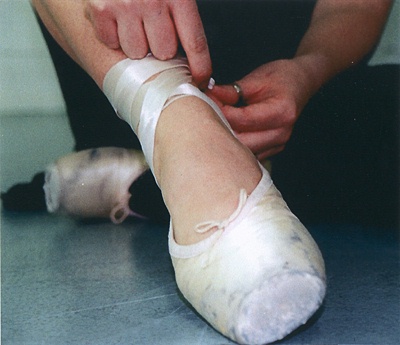All Nonfiction
- Bullying
- Books
- Academic
- Author Interviews
- Celebrity interviews
- College Articles
- College Essays
- Educator of the Year
- Heroes
- Interviews
- Memoir
- Personal Experience
- Sports
- Travel & Culture
All Opinions
- Bullying
- Current Events / Politics
- Discrimination
- Drugs / Alcohol / Smoking
- Entertainment / Celebrities
- Environment
- Love / Relationships
- Movies / Music / TV
- Pop Culture / Trends
- School / College
- Social Issues / Civics
- Spirituality / Religion
- Sports / Hobbies
All Hot Topics
- Bullying
- Community Service
- Environment
- Health
- Letters to the Editor
- Pride & Prejudice
- What Matters
- Back
Summer Guide
- Program Links
- Program Reviews
- Back
College Guide
- College Links
- College Reviews
- College Essays
- College Articles
- Back
Tricks or Tendus?
As a young girl in a flashy costume prances onto a stage in front of a panel of judges, another girl across the country walks into a ballet studio in the simple garb of a leotard and tights. Putting on a huge smile, the first girl begins her routine, kicking her leg up and performing tricks to dazzle the judges. In the quiet studio, the other dancer goes to the ballet barre to practice simple exercises, examining herself in the mirror to make sure that she executes them correctly. Boys and girls around the world take part in competitive and non-competitive dance training. Many people often wonder: Which way of training will they find more beneficial? These two ways of learning dance have several aspects in common; however, in order to determine the better way to study, one must examine the differences in these methods’ focus and training as well as how they prepare students for the future.
When deciding where to train, one must notice that these two types of studios share similarities. At both types of schools, students learn dance styles including ballet, jazz, and contemporary. Although studios often specialize in a certain style, they usually teach several. Studios also require a certain degree of commitment from dancers. In order to improve and learn more, students must attend a certain number of classes every week. Students can also benefit in some of the same ways no matter which type of school they attend. Non-competitive and competitive studios alike provide opportunities to perform in front of an audience. Also, both can help build their students’ confidence and self-discipline.
Despite several similarities between them, these two styles of dance training differ in their focus and teaching methods, important deciding factors of the better way to study dance. Competition studios mainly concentrate on performance and awards; they teach their students big stunts and tricks in order to impress judges and win prizes. Instead of focusing on the technique of dance, they stress presentation and routines. Competitive studios take part in dance championships across the country, with students performing solo and team routines. Non-competitive schools, however, emphasize correct technique, grounding students in the fundamentals of the fine art. Students learn in a non-competitive atmosphere and often have recitals for the public. Instead of performing in front of judges for an award, students enrolled in ballet schools can strengthen their dance skills while taking part in a less stressful performance experience. One must decide what he or she finds more important in his or her training: performing tricks or strengthening technique and quality.?
Both types of studios prepare students differently for future careers in dance. Dancers from competition studios may find themselves more prepared for the range of emotions that auditions can create. Competitive environments equip dancers for auditions because they have experienced the feelings of stress and nervousness similar to that of auditions. Students from non-competitive schools may struggle with nerves during try-outs, however, because they have not had as many stressful, antagonistic audition experiences. On the other hand, dancers from non-competitive studios may get into college dance programs or find jobs more easily because of their firm grounding in technique. Colleges and dance companies would often rather have a dancer that has good technique than a dancer that can easily perform stunts and tricks yet does not have strong basics.
In conclusion, one must look not only at the similarities between competitive and non-competitive dance studios when deciding where to train; he or she must also examine the differences in what the studios emphasize and how they teach and prepare their students. Comparing and contrasting these two methods of studying dance can provide a way to determine the better form of training. If a dancer merely wishes to perform and compete often and learn dazzling tricks and stunts than he or she may find a competition studio best suits his or her needs. However, if a person truly wishes to have a lasting career in the fine art of dance and wants to receive a strong grounding in technique, which truly proves more beneficial than flashy tricks, non-competitive dance schools represent the best option.

Similar Articles
JOIN THE DISCUSSION
This article has 2 comments.
